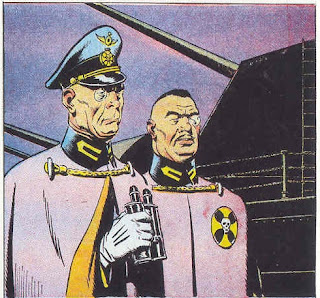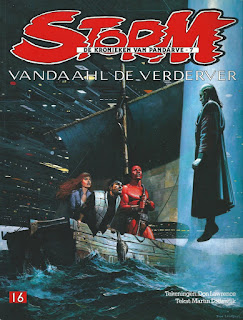8 hours ago
Thursday, January 31, 2019
Omniverse
Last year I did a series of superhero-themed posts on Google+ inspired by Wold-Newton essays and with the conceits there was only one Earth (encompassing both the Marvel and DC and possibly other "universes") and the world tended to work like our own, despite its somewhat altered history. This served to both ground the characters in history, making them more "realistic" and making history stranger! The name for the series was taken from Mark Gruenwald's 1979 fanzine alternate comic book realities.
With Gplus in its death throes, I exported those posts and they are now blogposts here. Only a few of them are currently visibly, but if you want to check them out, follow the Omniverse label at the bottom of this post.
Wednesday, January 30, 2019
Wednesday Comics: Storm: Vandaahl the Destroyer
My exploration of the long-running euro-comic Storm, continues with his adventures in the world of Pandarve. Earlier installments can be found here.
Storm: Vandaahl the Destroyer (1987) (part 1)
(Dutch: Vandaahl de Verderver)
Art by Don Lawrence; script by Martin Lodewijk
In a small, strange universe, somewhere in the multiverse, a war which has lasted for millions of years comes to an end. Vandaahl the Destroyer, Lord of Chaos, Agent of Death, is brought before his triumphant enemies. He gloats that he won the moment they chose to take up arms against him, and he relishes the irony that they will now kill him in the name of peace.
But his enemies don't plan to kill him. Instead, he will be locked in the Armor of Eternity. He will be held in stasis until the end of time. They also plan to throw the armor into a black hole. They are unsure of what will happen. The All-Creator will decide his fate.
Apparently, the All-Creator isn't done with Vandaahl. Drawn into the black hole, he isn't destroyed, but instead shunted through a white hole into another universe...
He comes down like a meteorite into the water world where Storm, Ember, and Nomad have been living with a community of fishermen. Nearly drowned in the resulting wave, our heroes decide to dive down and investigate when they see a glow beneath the water. Storm and one of the fishermen don special jellyfish and diving helmets and go down.
The next day, they come back to haul up the armored figure. Storm weirdly has a hard time touching it, like his hand and the figure are two magnets, repelling each other. They take the mysterious figures back to the fisherfolks' nest to take counsel with the elders.
While the adults are talking, children are playing around the figure. They inadvertently activate some controls...
And Vandaahl lives!
TO BE CONTINUED
Storm: Vandaahl the Destroyer (1987) (part 1)
(Dutch: Vandaahl de Verderver)
Art by Don Lawrence; script by Martin Lodewijk
In a small, strange universe, somewhere in the multiverse, a war which has lasted for millions of years comes to an end. Vandaahl the Destroyer, Lord of Chaos, Agent of Death, is brought before his triumphant enemies. He gloats that he won the moment they chose to take up arms against him, and he relishes the irony that they will now kill him in the name of peace.
But his enemies don't plan to kill him. Instead, he will be locked in the Armor of Eternity. He will be held in stasis until the end of time. They also plan to throw the armor into a black hole. They are unsure of what will happen. The All-Creator will decide his fate.
Apparently, the All-Creator isn't done with Vandaahl. Drawn into the black hole, he isn't destroyed, but instead shunted through a white hole into another universe...
He comes down like a meteorite into the water world where Storm, Ember, and Nomad have been living with a community of fishermen. Nearly drowned in the resulting wave, our heroes decide to dive down and investigate when they see a glow beneath the water. Storm and one of the fishermen don special jellyfish and diving helmets and go down.
The next day, they come back to haul up the armored figure. Storm weirdly has a hard time touching it, like his hand and the figure are two magnets, repelling each other. They take the mysterious figures back to the fisherfolks' nest to take counsel with the elders.
While the adults are talking, children are playing around the figure. They inadvertently activate some controls...
And Vandaahl lives!
TO BE CONTINUED
Monday, January 28, 2019
The Thrilling Adventures of Luke Skywalker
On Google Plus, Dan D. asked what my "solar system only" version of Star Wars would be. My initial impulse was to but Star Wars all on one fantastic planet like Mongo or on a planet system with a number of moons like Pandarve in Storm or Mongo of the 1980 film. On further consideration, I thought a more Buck Rogers or post-Raymond Flash Gordon thing would also be cool....
Planet Earth has once again been plunged into a World War. An oppressive Empire has gained control of five continents, and the Americas are under siege. Brave freedom fighter rocketeers striking from hidden bases, have managed to keep the military might of the Empire at bay.
To crush the resistance once and for all, the Empire has constructed a giant battle station within an asteroid. The power of the Death Star will spell certain doom for the Union of Pan-America, and for the other free worlds of the Solar System.
Princess Leia, a refugee of conquered Europe and Resistance agent, is charged with spiriting stolen plans to the Death Star off Earth and to the secret base on Ceres. Unfortunately, her ship is captured by a squadron of Imperial rockets commanded by Darth Vader.
 |
| The Death Star's commander, Grand Moff Tarkin, will interrogate the Princess personally |
 |
| Obiwan saves Luke from the savage Tuskens |
Spurred by the urgency of the message Obi Wan, Luke, the monkey, and the robot go to spaceport Mos Eisley to find a ship to carry them to Earth. They hire a hotshot pilot named Han Solo with a Venusian Wookie co-pilot, Chewbacca.
 |
| "She's fast enough for you, old man." |
 |
| "Bring me Solo!" |
You get the idea!
Sunday, January 27, 2019
Weird Revisited: A Traveller's Life
Recent discussion on Google Plus regarding Traveller made me recall this post originally from 2014...
E.C. Tubb's Dumarest of Terra novels are one of the primary inspirations for the game Traveller, though the game doesn't bother the central conceit of the novel. Tubb's protagonist Earl Dumarest other travellers are essentially space hobos: they book dangerous low passage in cryogenic berths from world to world. This contrasts with the wealthy in high passage, who take quick time drug to slow their perception and make time pass quicker to shorten the ennui of the voyage.
Though the Traveller mixes in other influences and gives PCs their own ship, Tubb's original set-up would make a good game all on its own. What's more, it strikes me that Dumarest would be pretty easy to turn into a "hard" science fiction game. It would be trivial to dispense with artificial gravity (and anti-gravity), but I think you could even dispense with FTL.
Alastair Reynolds's novels in the so-called "Revelation Space universe" show how this could be done. Reynolds has no FTL, but does have interstellar travel via "lighthuggers" making voyages at close to light-speed with relativistic time dilation at play. Passengers on lighthuggers are put in cyrogenic freeze because of the length of the voyages. Just like in the Dumarest novels, cyrogenesis isn't without risks. Some passengers die and many have temporary amnesia.
In a modern, hard science fiction approach, low passage wouldn't just be cheap, it would be the only way for the middle class and poor to travel between worlds. Middle passage (the crew) might be more like the Ultras in Reynolds's books: transhuman space-mariners, living their lives on board ship and looking down on system-bound folk. High passage is still for the wealthy, but I don't think quicktime drugs alone would be enough the years (or even decade) long voyages. The wealthy (like the ship's crew) would no doubt have extended lifespans: perhaps centuries--and possibly even immortality, barring misadventure. Superlong lifespans,quicktime drugs, and brief periods in cryo-sleep would make it possible, though the the ships would have to have a lot of entertainment available and be pretty large.
Obviously, you couldn't do a lot a travel back and forth between worlds in this sort of set up, but if like Dumarest you mostly kept moving from one adventure to another that wouldn't really be necessary. Travellers would always be on the move to the next world, far away and years into the future.
E.C. Tubb's Dumarest of Terra novels are one of the primary inspirations for the game Traveller, though the game doesn't bother the central conceit of the novel. Tubb's protagonist Earl Dumarest other travellers are essentially space hobos: they book dangerous low passage in cryogenic berths from world to world. This contrasts with the wealthy in high passage, who take quick time drug to slow their perception and make time pass quicker to shorten the ennui of the voyage.
Though the Traveller mixes in other influences and gives PCs their own ship, Tubb's original set-up would make a good game all on its own. What's more, it strikes me that Dumarest would be pretty easy to turn into a "hard" science fiction game. It would be trivial to dispense with artificial gravity (and anti-gravity), but I think you could even dispense with FTL.
Alastair Reynolds's novels in the so-called "Revelation Space universe" show how this could be done. Reynolds has no FTL, but does have interstellar travel via "lighthuggers" making voyages at close to light-speed with relativistic time dilation at play. Passengers on lighthuggers are put in cyrogenic freeze because of the length of the voyages. Just like in the Dumarest novels, cyrogenesis isn't without risks. Some passengers die and many have temporary amnesia.
Obviously, you couldn't do a lot a travel back and forth between worlds in this sort of set up, but if like Dumarest you mostly kept moving from one adventure to another that wouldn't really be necessary. Travellers would always be on the move to the next world, far away and years into the future.
Friday, January 25, 2019
Imskian [5e Race]
In the DC Universe, Imskians are denizens of the 30th (or 31th Century) native to the planet Imsk who have the ability to shrink. Shrinking Violet of the Legion of Super-Heroes is an Imskian. No reason Imskians (or something similar) can't show up in a fantasy world, though.
Imskian Racial Traits
Ability Score Increase. An Imskian can improve one ability score of their choice by 2 points and another by one point.
Age. Same as humans.
Alignment. Any.
Size. Imskians are Medium.
Speed. Base walking speed is 30 feet.
Languages. Imskian can speak, read, and write Imskian and Common.
Shrinking. Using a bonus action, an Imskian can reduce their size to Tiny (in game terms, though actually height may vary). Returning to normal size also requires a bonus action. Their clothes and equipment carried on their person shrink as well. Their weapons do 1d4 less damage (minimum of 1) at the reduced size. Imskians have a disadvantage on Strength checks and saving throws when decreased in size, but an advantage on Stealth checks. They can can attempt to hide even when obscured only by a creature that is at least one size larger. Their Armor Class is increased by one at their shrunken size.
Thursday, January 24, 2019
Solar Trek: Troublesome Tribbles
In 2262, Federation authorities became aware of a potentially invasive synthetic organism known as the tribble. The origin of tribbles is unknown. They contain no bio-engineering markers that betray their origins. They appeared among the wares of a trader, Cyrano Jones, on Deep Space Station K-7 (located at 10 Hygiea). All known specimens were obtained from Jones's stock or are their descendants.
Jones sold his tribbles as exotic pets, a role they were perhaps designed for, given that their mild vibration, soft purring, and warmth are considered pleasing by many. Despite their superficial mammalian characteristics, tribbles are invertebrates, perhaps derived from echinoderm genetic stock. They are, however, endothermic with a high metabolic rate and frequent parthenogenesis, leading to tribbles consuming large amounts of food. All tribbles are able to adhere to surfaces and tribble newborns small size allow them to spread virtually everywhere not environmental sealed.
The tribble infestation on K-7 consumed food stores and cultures destined for outer colonies in a surprisingly short period of time. Luckily this revealed tampering by Klingon agents that might have lead to deaths and certainly food shortages otherwise. It is ironic that tribbles seem to become agitated with proximity to genetic Klingons.
The Klingons are rumored to have engineered a tribble predator called a glomer, but local authorities are strongly cautioned against viewing a second synthetic organism as an easy solution to any tribble infestation.
Jones sold his tribbles as exotic pets, a role they were perhaps designed for, given that their mild vibration, soft purring, and warmth are considered pleasing by many. Despite their superficial mammalian characteristics, tribbles are invertebrates, perhaps derived from echinoderm genetic stock. They are, however, endothermic with a high metabolic rate and frequent parthenogenesis, leading to tribbles consuming large amounts of food. All tribbles are able to adhere to surfaces and tribble newborns small size allow them to spread virtually everywhere not environmental sealed.
The tribble infestation on K-7 consumed food stores and cultures destined for outer colonies in a surprisingly short period of time. Luckily this revealed tampering by Klingon agents that might have lead to deaths and certainly food shortages otherwise. It is ironic that tribbles seem to become agitated with proximity to genetic Klingons.
The Klingons are rumored to have engineered a tribble predator called a glomer, but local authorities are strongly cautioned against viewing a second synthetic organism as an easy solution to any tribble infestation.
 |
| Cyrano Jones with a tribble in 2262 |
Monday, January 21, 2019
Solar Trek: Underside of the Clouds
In the middle of the the 23rd Century, a cluster of aerostat colonies floating over 50 km above Venus were known for their achievements in the arts and sciences. What was not known until the Disrupter revolt of 2263 was that the innovation and productivity of the self-styled creative class depended on workers who lived in relatively poor conditions in the industrial areas of the cities' underside.
Analysis by the Medical staff of the Federation vessel, Enterprise, revealed that the chemical exposure among the workers and their families led to impaired cognitive function and, in some cases, propensity for violence. Popular theories among the upper class of the cities, particularly in the unofficial capital of Stratos, attributed these impairments to genetic rather than environmental issues. Citing safety concerns, the undersiders' movements were restricted on visits to the upper level, and they were often under surveillance by security personnel.
Pressure from the Federation after details of Enterprise's report were made public, ultimately led to increased freedom for the people of the under city and environmental clean-up.
Analysis by the Medical staff of the Federation vessel, Enterprise, revealed that the chemical exposure among the workers and their families led to impaired cognitive function and, in some cases, propensity for violence. Popular theories among the upper class of the cities, particularly in the unofficial capital of Stratos, attributed these impairments to genetic rather than environmental issues. Citing safety concerns, the undersiders' movements were restricted on visits to the upper level, and they were often under surveillance by security personnel.
Pressure from the Federation after details of Enterprise's report were made public, ultimately led to increased freedom for the people of the under city and environmental clean-up.
 |
| Capt. Kirk of Enterprise observed the torture of a captured Disrupter insurgent by Stratos security forces |
Subscribe to:
Posts (Atom)





















